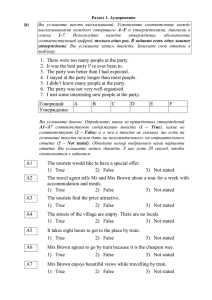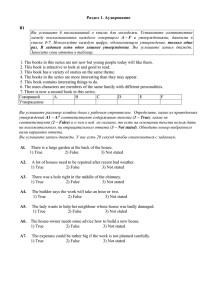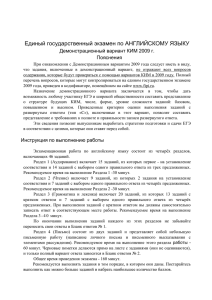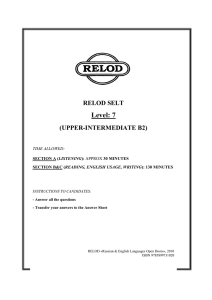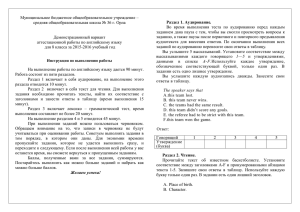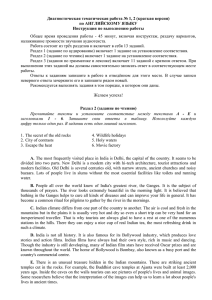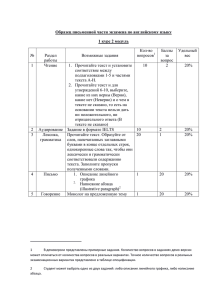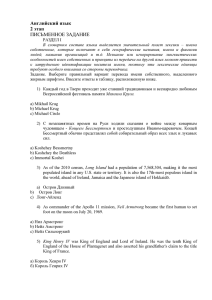Macmillan Practice Tests for the Russian State Exam. Издание
реклама
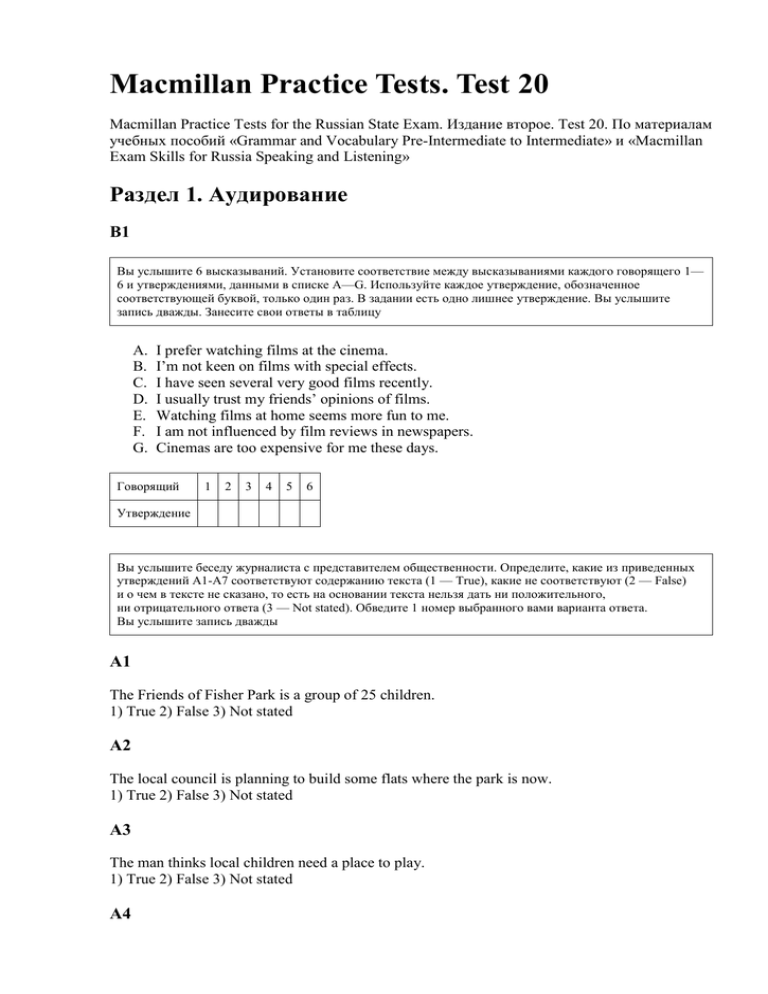
Macmillan Practice Tests. Test 20 Macmillan Practice Tests for the Russian State Exam. Издание второе. Test 20. По материалам учебных пособий «Grammar and Vocabulary Pre-Intermediate to Intermediate» и «Macmillan Exam Skills for Russia Speaking and Listening» Раздел 1. Аудирование B1 Вы услышите 6 высказываний. Установите соответствие между высказываниями каждого говорящего 1— 6 и утверждениями, данными в списке A—G. Используйте каждое утверждение, обозначенное соответствующей буквой, только один раз. В задании есть одно лишнее утверждение. Вы услышите запись дважды. Занесите свои ответы в таблицу A. B. C. D. E. F. G. I prefer watching films at the cinema. I’m not keen on films with special effects. I have seen several very good films recently. I usually trust my friends’ opinions of films. Watching films at home seems more fun to me. I am not influenced by film reviews in newspapers. Cinemas are too expensive for me these days. Говорящий 1 2 3 4 5 6 Утверждение Вы услышите беседу журналиста с представителем общественности. Определите, какие из приведенных утверждений А1-А7 соответствуют содержанию текста (1 — True), какие не соответствуют (2 — False) и о чем в тексте не сказано, то есть на основании текста нельзя дать ни положительного, ни отрицательного ответа (3 — Not stated). Обведите 1 номер выбранного вами варианта ответа. Вы услышите запись дважды A1 The Friends of Fisher Park is a group of 25 children. 1) True 2) False 3) Not stated A2 The local council is planning to build some flats where the park is now. 1) True 2) False 3) Not stated A3 The man thinks local children need a place to play. 1) True 2) False 3) Not stated A4 The group has just sent a letter to every councillor. 1) True 2) False 3) Not stated A5 There are council elections every two years. 1) True 2) False 3) Not stated A6 The man has decided that he wants to be on the local council. 1) True 2) False 3) Not stated A7 The council will make its decision about the park next month. 1) True 2) False 3) Not stated A1 A2 A3 A4 A5 A6 A7 Вы услышите высказывания людей в семи различных ситуациях. Ответьте на вопросы по содержанию высказываний, выбрав один из предложенных вариантов ответа. В заданиях А8-А14 обведите цифру 1,2 или 3, соответствующую выбранному вами варианту ответа. Вы услышите запись дважды А8 You will hear a news report about a fire. What was its probable cause? 1. a person 2. lightning 3. faulty electrical wiring A9 You will hear a politician talking about her career. When did she become interested in politics? 1. at school 2. at university 3. at work A10 You will hear a man talking about his house. What is he going to build next? 1. an extension to the living room 2. a swimming pool 3. a garage A11 You will hear a nurse talking to a patient. What does he want the patient to do? 1. get out of bed 2. eat her lunch 3. take her tablets A12 You will hear a woman talking about a lot of money. How did she get it? 1. She won the national lottery. 2. She entered a competition in a magazine. 3. She inherited it from a relative. A13 You will hear a singer talking about his next album. What inspired him to write the songs on the album? 1. his success 2. a relationship 3. his recent tour A14 You will hear a woman talking about moving to another country. What did she find difficult? 1. getting a job 2. learning the language 3. meeting new people A8 A9 A10 A11 A12 A13 A14 По окончании выполнения заданий В1 и А1-А14 НЕ ЗАБУДЬТЕ ПЕРЕНЕСТИ СВОИ ОТВЕТЫ В БЛАНК ОТВЕТОВ № 1 ОБРАТИТЕ ВНИМАНИЕ, что ответы на задания Bl, A1-A14 располагаются в разных частях бланка. В1 расположено в нижней части бланка. При переносе ответов I в задании В1 буквы записываются без пробелов и знаков препинания. Раздел 2. Чтение B2 Установите соответствие между заголовками А-Н и текстами 1—7. Занесите свои ответы в таблицу. Используйте каждую букву только один раз. В задании один заголовок лишний A. B. C. D. E. F. G. H. UNUSUAL RELATIONSHIPS SIMILAR CHARACTERISTICS DIFFICULT PERIODS TWO TYPES IMPORTANT MOMENTS MISTAKEN BELIEFS MANY RESPONSIBILITIES HOME ALONE 1. In Britain, most families are 'nuclear families'. This means that the family consists of the parents and children. Of course, there are uncles and aunts and grandparents too, but they do not have much to do with raising the children and often live a long way away. In many other countries, the extended family' is more common. With the extended family, uncles, aunts and grandparents live much closer to the parents and children — sometimes even in the same building — and everyone in the family has a much closer relationship. 2. Most teenagers say at some point: 'When I’m a parent, I’m going to give my children much more freedom than I have now.' When they do actually become parents however, they soon realise that giving a child or teenager lots of freedom is not always the best thing to do. Many parents end up hearing their children saying to them exactly the same things they said to their parents when they were young. 3. What does bringing up a child involve? Giving a child love and making a child feel safe in their environment are extremely important. So is providing food and warmth. Parents also have a duty to teach their children the difference between right and wrong, and to make sure their children get a good education. Some parents believe that their role is also to teach children about the importance of things such as family, religion and society. 4. The English phrases 'a chip off the old block' and like father, like son' (or 'like mother, like daughter') are used to show the similarities between a parent and their child. These might be similarities in terms of appearance, behaviour or interests. For example, if a dad loves watching cricket and his son Eric becomes interested in cricket too, you might say, 'Eric’s a chip off the old block, isn’t he?' 5. 'Latchkey kids' are a major problem in many countries, including Britain and the USA. These are children whose parents are still at work when they come home from school, so there is no one at home to look after them. Their parents aren’t there to help them with their homework, and some of them spend hours on their own before their parents return. 6. The idea of'quality time' is based on an understanding that the amount of time a parent spends with their child is not the only important thing. What is also important is what they do together during that time. Ten minutes of discussing problems that a teenager is facing may be much more valuable than two hours of watching a movie together in silence. 7. Families work well when things are going well, but the real test of a family comes at times of stress. Perhaps Mum has been working too hard, or perhaps young Amy is taking exams at school. These are times when all families can find themselves fighting instead of helping each other. When a family is going through a crisis like this, it can often help to talk to someone outside the family. It could either be an expert, such as a family counsellor, or a trusted family friend. 1 2 3 4 5 6 7 B3 Прочитайте текст и заполните пропуски 1—6 частями предложений, обозначенными буквами A-G. Одна из частей в списке A-G — лишняя. Занесите букву, обозначающую соответствующую часть предложения, в таблицу The Eden Project, near St Austell in Cornwall, is not just one of the area’s major tourist attractions. Over a million people visit the Eden Project each year. It is now one of the most popular attractions in the whole of the UK, 1 ___. Tim Smit was the person responsible for turning the Eden Project from a dream into a reality. Built on the site of an old china clay quarry, the Eden Project currently consists of two 'biomes' and a Visitor Centre, 2 ___. Each biome is an enormous greenhouse. And they are enormous! The Humid Tropics biome, which contains plants and trees from tropical countries, is 100 metres wide, 200 metres long and 55 metres high. The second biome, which is called the Warm Temperate biome, is slightly smaller. Visitors walk through the biomes 3 ___. The biomes also contain sculptures, waterfalls and birds and insects from the same environments that the plants come from. Information is given about each plant 4 ___. The latest addition to the Eden Project is the Core. This building contains classrooms and exhibition spaces where visitors learn more about the environment. The design of the building matches the philosophy of the Eden Project, 5 ___. The Eden Project has appeared in films and is used as a venue for other forms of entertainment, 6 ___ A. B. C. D. E. F. G. 1 2 despite being fairly new using shapes from nature including concerts and plays whereas there are no plans for other biomes so visitors understand the display which includes a cafe and gift shops looking at the thousands of plants and trees 3 4 5 6 Прочитайте текст и выполните задания А15-А21, обводя цифру 1,2, 3 или 4, 1 соответствующую номеру выбранного вами варианта ответа Damian would never have called himself a bully. A victim of bullying himself on occasion, if he’d thought for one second that he was bullying his classmates, he would have been devastated. The idea that he bullied his friends had never even entered his head. But now he was having to face up to the fact that perhaps in certain ways he was a bully. It had all started in the mid-morning break, when Damian and a couple of his friends were discussing what to do about Frank Rice. Frank Rice was a bully and the whole school knew it. The question was, should they tell a member of staff the next time Frank picked on one of them? Damian thought they should. Chris and Will thought that they shouldn't. As they were arguing, Damian said: 'We’ve got to do something. He’s making people’s lives a misery. It can’t go on like this.' There was silence when Chris replied: 'Well, he’s not the only one, you know. You should take a look in the mirror, Damian, before accusing other people. You’re not perfect, you know.' Damian was so shocked, he didn’t know how to reply. He didn’t know where to begin. Finally, he managed to ask: 'What on earth do you mean? You’re not suggesting I’m a bully, are you? How am I like Frank Rice?' Will explained. 'No, you’re not like Frank Rice at all. Chris didn’t mean that. You don’t hit people, you don’t want to be horrible and nasty. You’re usually just trying to be funny, but sometimes the things you say do hurt people. Quite often, in fact."Give me an example,' said Damian. 'Well, take yesterday, for example,' said Will, 'when we were in the changing room after football. You kept saying how Chris was such a terrible goalie, you seriously wondered if he’d been bribed by the other team.' T was only joking!' protested Damian. 'You know that, Chris, don’t you? I was only teasing.' "That’s exactly the point,' said Will. 'You were teasing Chris. And you do that a lot. It’s not very nice, you know. I could see that Chris was upset, even if you didn’t notice.' 'Were you, Chris?' 'Well, I can’t say I enjoyed it, to be honest. And Will’s right. You do seem to do it a lot.' The bell rang, and they went off to class. Damian found it hard to concentrate for the rest of the morning. The conversation he’d had with Will and Chris kept coming back to haunt him. Was he a bully? If he was, he certainly didn’t mean to be. But there was no escaping the fact that two very good friends of his thought that his comments often hurt them. At lunch, Damian, as usual, sat next to Chris and Will. 'Guys, I’ve been thinking about what we were talking about earlier and I think you’re right. I just want to say that I’m really, really sorry. You’re my best friends, and I’d never do anything to hurt you on purpose. I can see that I do sometimes say things that would upset you, and I’m going to make a real effort not to do that from now on. Still friends?' 'Of course we are, Damian,' said Chris.'But thanks' 'No problem,' said Will. In the changing room that afternoon after football practice, Damian, Chris and Will were discussing the game. Will had fallen over the ball at one point, and Damian was just about to make a joke about it when he stopped himself. Am I allowed to say something like that?' he thought to himself. 'We are friends. We’ve got to be able to joke with each other. Or is it too nasty?' Damian decided not to say anything on this occasion, but he began to realise that keeping his promise to Chris and Will would not be as easy as he’d thought. А15 From the first paragraph we learn that Damian has 1. 2. 3. 4. sometimes been bullied by other people. never thought about bullying before. briefly considered bullying his classmates. only been bullied once in his life. A16 The boys disagree about whether 1. 2. 3. 4. Frank will bully them again in the future. they should have told a teacher about Frank. Frank is making people feel very miserable. to tell a teacher if Frank bullies them again. A17 When Chris tells Damian to 'take a look in the mirror', he means Damian should 1. 2. 3. 4. look at what Frank has done to him. take more care with his appearance. think about his own behaviour. remember that no one is perfect. A18 Will’s explanation to Damian suggests that Frank Rice 1. 2. 3. 4. never tries to make people laugh. sometimes uses physical violence. doesn’t want to be nasty either. only uses language to hurt people. A19 The example from the previous day that Will gives shows that 1. 2. 3. 4. Will thinks it is extremely funny when Damian teases Chris. Damian only teases Chris and never makes jokes about Will. Damian’s jokes about Chris and Will can sometimes be cruel. Chris gets more upset by Damian’s comments than Will does. A20 Damian finds it difficult to concentrate in class because he 1. 2. 3. 4. is angry his friends have accused him of being a bully. believes he will never be friends with Chris and Will again. is continually looked at by Will and Chris during the lessons. can’t stop thinking about what he’s been accused of. A21 In the changing room, Damian understands that 1. 2. 3. 4. A15 it is difficult to balance making jokes with being nice. he has already broken his promise to Chris and Will. keeping his promise is the most important thing to him. stopping himself from saying nasty things will be impossible. A16 A17 A18 A19 A20 A21 По окончании выполнения заданий В2, ВЗ и А15-А21 НЕ ЗАБУДЬТЕ ПЕРЕНЕСТИ СВОИ ОТВЕТЫ В БЛАНК ОТВЕТОВ № 1 ОБРАТИТЕ ВНИМАНИЕ, что ответы на задания В2, ВЗ и А15-А21 располагаются в разных частях бланка. Раздел 3. Грамматика и лексика Прочитайте приведенный ниже текст. Преобразуйте, если необходимо, слова, напечатанные заглавными буквами в конце строк, обозначенных номерами В4-В10, так, чтобы они грамматически соответствовали содержанию текста. Заполните пропуски полученными словами. Каждый пропуск соответствует отдельному заданию из группы В4-В10 Alexander Fleming Have you heard of penicillin? It’s a type of medicine that В4 ___KILL___ bacteria. Bacteria can cause infections. Many people В5 ___DIE___ in the past because of them. A doctor from Scotland called Alexander Fleming discovered antibiotics. Fleming В6 ___STUDY___ medicine at St Mary’s Hospital in London. During the First World War, he worked in a hospital in France, В7 ___HELP___ the soldiers who had been hurt. After the war, he В8 ___MAKE___ an important discovery. He discovered a way to kill bacteria. At the time, however, other doctors В9 ___NOT UNDERSTAND___ how important Fleming’s discovery was. Because of this, he stopped doing his experiments. It В10 ___TAKE___ several years for scientists to realise that Fleming had found a way to save millions of lives. B4 B5 B6 B7 B8 B9 B10 Прочитайте приведенный ниже текст. Преобразуйте, если необходимо, слова, напечатанные заглавными буквами в конце строк, обозначенных номерами В11-В16, так, чтобы они грамматически и лексически соответствовали содержанию текста. Заполните пропуски полученными словами. Каждый пропуск соответствует отдельному заданию из группы В11-В16 Harry Houdini is said to be the greatest magician of all time. He started doing his magic show professionally in the USA in 1891. In 1893, he met a fellow B11 ___PERFORM___ called Bess Rahner. They married three weeks later and, for the rest of Houdini’s career, Bess worked as his B12 ___ASSIST ___ on stage. Houdini mainly concentrated on card tricks at the В13 ___BEGIN___ of his career. It was his incredible escape acts, though, that brought him fame and great wealth. In 1904, after a four-year B14 ___EUROPE___ tour, Houdini returned to the States with cause for B15 ___CELEBRATE___ . He had become a major star in the entertainment world and audiences couldn’t get enough of his B16 ___DRAMA___ and exciting act. Houdini carried on thrilling audiences until his death in 1926, at the age of 52. B11 B12 B13 B14 B15 B16 Прочитайте текст с пропусками, обозначенными номерами А22-А28. Эти номера соответствуют заданиям А22-А28, в которых представлены возможные варианты ответов. Обведите номер выбранного вами варианта ответа 'Jane, will you marry me?' It was not the most romantic of settings. Graham and Jane were in the supermarket, and Jane was in the middle of pointing out to Graham that the supermarket's own A22 ___ of soup was exactly the same as the more famous, but more expensive, soup next to it. 'don’t be silly, Graham,' was Jane's reply. I’m not being silly. I’m deadly serious.' To A23 ___ it, Graham got down on one knee. 'Graham, people are looking. Get up!' 'Not until you give me an answer,' said Graham, beginning to get annoyed. 'All right. The answer’s no.' Graham paused. 'No?' he finally said. 'No? Why not? Give me one good A24 ___ .' He began to feel slightly uncomfortable — physically and emotionally. 'I can’t believe we’re having this conversation here,' said Jane. 'Let’s just finish the shopping and go home.' 'I’m not going anywhere until you’ve explained to me why we shouldn’t get married. We love each other!' 'Of course we do,' said Jane, A25 ___ if she was talking to a young child, 'but that doesn’t mean we should get married, does it? You get married when you want to settle A26 ___ and make a life together. I only met you three months ago. Ask me again in a year or two, if we’re still going A27 ___ together.' 'If… if,' stammered Graham. 'You think we might not be?' 'Graham!' said Jane. 'You’re being ridiculous! Now, let’s not talk about it again. A28 ___ me a packet of spaghetti, would you?' Graham handed Jane the spaghetti. 'So, you'll think about it, then?' he asked eventually. Jane rolled her eyes, let out a deep sigh, and pushed the trolley over to the breakfast cereals. A22 1. 2. 3. 4. product mark brand style A23 1. 2. 3. 4. present exhibit reveal prove A24 1. 2. 3. 4. thought sense reason cause A25 1. 2. 3. 4. as even what only A26 1. 2. 3. 4. down in up on A27 1. 2. 3. 4. by off out with A28 1. 2. 3. 4. A22 Deliver Pass Donate Forward A23 A24 A25 A26 A27 A28 По окончании выполнения заданий В4-В16, А22-А28 НЕ ЗАБУДЬТЕ ПЕРЕНЕСТИ СВОИ ОТВЕТЫ В БЛАНК ОТВЕТОВ № 1 ОБРАТИТЕ ВНИМАНИЕ, что ответы на задания В4-В16, А22-А28 располагаются в разных частях бланка. При переносе ответов в задании В4-В16 буквы записываются без пробелов и знаков препинания. Раздел 4. Письмо Для ответов на задания Cl, С2 используйте БЛАНК ОТВЕТОВ № 2. При выполнении заданий С1 и С2 особое внимание обратите на то, что ваши ответы будут оцениваться только по записям, сделанным в БЛАНКЕ ОТВЕТОВ № 2. Никакие записи черновика не будут учитываться экспертом. Обратите внимание также на необходимость соблюдения указанного объема текста. Тексты недостаточного объема, а также часть текста, превышающая требуемый объем — не оцениваются. При заполнении БЛАНКА ОТВЕТОВ № 2 вы указываете сначала номер задания Cl, C2, а потом пишите свой ответ. Если одной стороны бланка недостаточно, вы можете использовать другую сторону бланка С1 You have 20 minutes to do this task. You have received a letter from your English-speaking pen friend Rebecca, who writes: My parents often get annoyed with me because I spend a lot of time on the phone talking to my friends. How can I explain to my parents that my friends are very important to me? How can I stay in touch with my friends if I don’t use the phone? What can I do about the situation? By the way, a new shopping centre has opened in our town! Write a letter to Rebecca. In your letter: answer her questions ask 3 questions about the new shopping centre Write 100—140 words. Remember the rules of letter writing. С2 You have 40 minutes to do this task. Comment on the following statement. Technology is an important part of our lives. We use computers and other electronic equipment at work and in the home. However, some people believe we rely too much on machines, and that the more technology improves, the lazier and weaker humans will become. What can you say for and against future technological developments? Write 200—250 words. Use the following plan: 1. 2. 3. 4. Make an introduction (state the problem). Express your personal opinion and give reasons for it. Give arguments for the other point of view and explain why you don’t agree with it. Draw a conclusion. Раздел 5. Говорение Вы получите карточку, на которой представлены два задания для устного ответа: СЗ — тематическое монологическое высказывание, С4 — диалог с целью обмена оценочной информацией. Окончание выполнения каждого задания определяет экзаменатор. Во время проведения этой части экзамена идет постоянная аудиозапись вашего ответа Задания для экзаменуемого C3 Task 1 (3—3.5 minutes) Give a 2-minute talk on your best friend. Remember to say: what your best friend looks like why you like him/her when and how you met what you have in common with him/her You have to talk for 1.5—2 minutes. The examiner will listen until you have finished. Then he / she will ask you some questions. C4 Task 2 (3—4 minutes) You are on holiday with a friend and it is your final day. You have time to see one more tourist attraction before leaving. You and your friend are discussing what to go and see. You can go: to an art gallery to a funfair to a castle to a beach You begin the conversation. The examiner will play the part of your friend. Remember to: discuss all the options be polite take an active part in the conversation come up with ideas give good reasons find out your friend’s attitudes and take them into account invite your friend to come up with suggestions come to an agreement Тексты к аудированию B1 Speaker 1: I suppose I watch several films a week, whether that’s at the cinema, on TV or getting a DVD from the local video store. What have I seen in the past few days? The latest Star Wars movie. That was fantastic! The effects were brilliant! A comedy with Hugh Grant. He’s so funny. I just laughed and laughed. Oh, and a movie I’ve wanted to see for a long time, Cinema Paradiso. It was incredible. Really moving. I cried for the last hour! Speaker 2: I’d much rather watch a romantic comedy, say, something with Hugh Grant in it, or a movie like Cinema Paradiso than a big-budget blockbuster like Star Wars or War of the Worlds. I mean, they just use computers to create the effects, don’t they? I’d much rather see a film with good acting and a good script than loads of explosions or computer-generated aliens. Speaker 3: I love films. I can watch anything, really. doesn’t matter if it’s just full of special effects or it’s a really simple drama. I go to the cinema quite often, but I’d never decide to see a film on the basis of what it said in the paper. That’s just one person’s opinion, isn’t it? And reviewers look at films differently to the rest of us, anyway. No, if I like the sound of the title, or if I know any of the actors in it, I'll probably risk it. Speaker 4: Well, I do like going to the cinema, but it’s not as cheap as it used to be. If we take the kids, by the time we’ve bought some popcorn and had a drink, it’s about £50. That’s a lot of money for a couple of hours of some special effects. It’s a shame, though, because the kids really do enjoy seeing a film in the cinema. Makes it more of an event. It’s just not worth it financially, though. Speaker 5: Well, we do watch quite a lot of movies at home. We watched the latest Star Wars film only the other night on DVD. Great effects, by the way. But the problem with watching films at home is that there’s too many distractions. People talk and the phone rings. That kind of thing. When you actually see a film on the big screen, you get so much more involved with what’s happening. It’s strange — there’s more people around you, but you can actually concentrate more. Speaker 6: There are just so many films on these days that it’s not always easy to decide what you want to see. Reviews in magazines or online can be useful, but I usually want to ask people I know what they think of the films. They know what I like, and they usually have a good idea of whether I’d like a film or not. Sometimes they get it wrong, but not often. A1-A7 Journalist: Hello, I’m looking for John Stapleton. Man: That's me. Journalist: Oh, hi. My name’s Janice Short. I’m a reporter with the Pennington Evening News. I wonder if I could ask you a few questions. Man: About the council’s plan to close the park? Journalist: That’s right, yes. Man: Fantastic. We need all the publicity we can get. Journalist: So, who exactly is 'we'? Man: Well, we’re just a group of people who live round here, really. Most of us have kids. There’s about twenty-five of us, I’d say, who are actively involved. We’re calling ourselves the Friends of Fisher Park. Journalist: And what exactly do you hope to achieve, Mr Stapleton? Man: It’s very simple. We want to stop the council from destroying the park to build a block of flats. Journalist: You do accept, though, that we really do need some new, cheap accommodation in the town centre? Man: Oh yes. We do recognise there’s a problem, and that land is in short supply. But to destroy the only green area for miles around. Well, it’s a disgrace. Kids can’t play in the streets anymore, obviously. We’ve got to give them somewhere to be able to run around. The park’s been that place for over fifty years, and we won’t give it up without afight. Journalist: Do you think you’ve got a chance of winning? Man: I do, yes. The people are all on our side, you know. We’ve got a letter which we’re going to send to every councillor next week. It’s got over two thousand signatures on it. Journalist: But will the council listen to you? Man: Well, it’s council elections in about six months. If they don't, I think they'll find that a lot of people don’t vote for them. They’re supposed to represent us, aren’t they? If they don't, why should we vote for them? Journalist: Are you considering standing for a council position in the next election, then? Man: I haven’t made my mind up yet, to be honest. It’s a possibility, though. Journalist: So, you’ve got the letter. What happens next? Man: Well, the council meets on the 24th of this month to make a final decision. We'll all be at the meeting, of course. And I hope lots of other people will be too. The more people we can get there, the more pressure there'll be on the council to change its mind. Journalist: Well, good luck. Thanks for your time. Man: My pleasure! A8-A14 Situation 1 Man: And in local news, police have announced today that initial reports that the fire at Johnson’s Hardware Store, on the Dagenham Road, was caused by a lightning strike were unfounded. Investigators have also ruled out faulty electrical wiring and police are now searching for a woman who was seen at the building just minutes before the fire started. Situation 2 Woman: Well, I did an A level at school in politics and economics, and I actually did very well in the exam, but my heart really wasn’t in the subject at that point. It was when I was working as a reporter for a local newspaper that I finally decided to go into politics as a career, but I suppose my love for politics really began when I got involved with the Student Union while I was doing my law degree. Situation 3 Man: You can just see the new extension to the living room over there through the trees. We’re going to decorate it next week, so hopefully it'll be ready for Christmas, as will the garage, of course, which we’re starting work on next Monday. Where we’re standing right now will hopefully be an outdoor swimming pool before too long, but we'll have to save up a bit first! Situation 4 Man: Come on, Mrs Jacobs. You know what the doctor said. You have to take these pills as soon as you’ve had lunch. As you’re not going to finish your dessert, that means it’s time. Yes, you can get out of bed in a short while, but just pop these into your mouth first. With some juice, that's right. Situation 5 Woman: You hear about people winning millions in the lottery, don’t you? But you always think something like that will never happen to you. Well, it has to me! When my great aunt died a few years ago, she did leave me some money in her will, but it wasn’t much and it certainly wasn’t life-changing. With this, though, I can quit my job and live in luxury for the rest of my life. I’d like to thank all of you at People magazine. I’m just so glad I sent off the answers to those three questions you printed! Situation 6 Man: Yeah, the new album comes out next week. It’s called Variations, and I think it’s quite different to my last album. A lot of the songs on that were to do with dealing with being successful, as lots of second albums are, I suppose. But while I was on tour recently I, er,fell in love, actually, and I think that’s what’s motivated me to write these twelve tracks. Situation 7 Woman: Oh yes, I’ve been here a long time. Over ten years. When I first arrived, I couldn’t speak the language at all. Not a word! I picked it up relatively quickly, though. Well, I made a real effort to meet people, you see, and really tried not to speak to them in English. And as it took months and months for me to find work, I had a lot of time on my hands to get to grips with the language. Карточка экзаменатора-собеседника Warm-up 1. How much free time do you have each week? 2. What do you like doing in your free time? 3. Do you spend more time with your family or friends? Interlocutor card C3 Task 1 (3—3.5 minutes) Let the student talk for 1.5—2 minutes. Ask only those questions which the student has not covered while giving a talk. 1. 2. 3. 4. What does your best friend look like? Why do you like him/her? When and how did you meet? What do you have in common with him/her? All of these ideas must be covered. Finally, you must ask each student the following questions: 1. Is it important to have a best friend? Why? 2. Why do people sometimes argue with their friends? Interlocutor card C4 Task 2 (3—4 minutes) You and the student are discussing which tourist attraction to visit on the final day of your holiday together. These are your ideas about each option: art gallery funfair castle + I’ve never been very interested in art, so I might get bored. It wouldn’t really tell us anything about the local area. It’s the final day of our holiday, so maybe we should do something outdoors. I’m rather tired. It will probably be very crowded and noisy. I find the rides at funfairs very frightening. Castles are usually on top of hills and I don’t feel like doing so much walking. We’ve already seen some castles on this holiday and I don’t really want to see another one. It’s a great chance to see works that we might never see again. We might be able to buy copies of some of the pictures to take home as souvenirs. It would be an exciting way to spend the day. It would be nice to be out in the open air. We could take some great photos to show people when we get back home. We would probably learn a lot about the history of the local area. There might be lots of places to explore. We don’t have buildings like that at home, so we shouldn’t miss the chance. beach The weather isn’t so good, and it might get worse. We can lie on a beach any time. We don’t want to get our things wet or full of sand if we’re travelling tomorrow. It would be nice to go for a swim. We haven’t been to the beach much on this holiday, and it might be fun. We could go fishing. Note: Make sure all the options have been discussed. When discussing each option, first use the information that is contrary to what the student says. You may choose to make use of some ideas only. Do not speak first all the time, but ask the student what he / she thinks about the options. Invite the student to come up with his/her suggestions, especially if he / she readily agrees with the things you say. If the student says all the time,'What do you think about it?' without expressing his/her own opinion, say: 'Sorry, I don’t know.' or 'I’m not sure. How do you feel about it?' Skills to be tested The student is expected to demonstrate her / his ability to: initiate and maintain conversation: — explain the situation — come up with suggestions — give good reasons — find out the partner’s attitudes — invite the partner to come up with suggestions — agree or disagree with her / his partner’s opinion reach an agreement by taking into account the partner’s attitudes.
